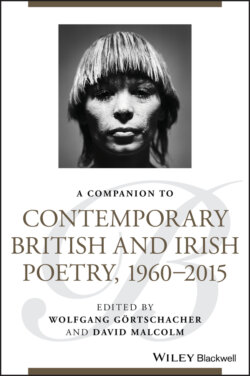Читать книгу A Companion to Contemporary British and Irish Poetry, 1960 - 2015 - Группа авторов - Страница 21
Jenny Joseph, “Warning” (1974) (Joseph 1992, 42)
ОглавлениеThe title of this very popular poem (according to a BBC poll in 1996) is paradoxically threatening. It points to a future of bad behavior and imperiling of social norms. However, it must—like much of the poem—be seen as ironic and humorous. The speaker's misconduct will scarcely shift the social order.
The poem is lucid in its organization. In the first stanza, the speaker indicates the forms her delinquencies will take. Stanza 1 brings in the addressee, or at least a more general “you,” suggesting how one could further behave badly. But stanza 3 sets out all the conforming things that “we” all must do now. The last stanza, however, briefly suggests that the malfeasance could start now, for the sake of practice. This semantic lucidity is coupled with a rhetoric of syntactic parallelism that shapes the first three stanzas: “I shall,” “you can,” and “now we must.” Stanza 4 breaks the pattern: it asks the only question in the poem, and has no syntactic parallelism. However, it does neatly tie the poem up by its echoing of the first words of the poem in “When,” “I am,” and “old.”
The regularity and coherent organization of the poem are further marked rhythmically. Iambic feet clearly dominate the piece, clustering especially in stanza three, that is, in the stanza that is about the force of norms. Although there is a variation in line length—from 4 to 14 syllables—most lines vary only from 11 to 13 syllables. With very few exceptions, lines have four to five main stresses. This cohesive regularity is challenged in places, however. Amphibrachs (x/x) are scattered throughout the text, and several feet of four to five syllables (long by English versification norms) can be identified. In addition, 10 out of 22 lines end in an unstressed syllable. All this makes the poem less controlled and coherent, and perhaps less decisive and certain. But predominantly, this is a poem about disorderly behavior that is extremely orderly, and that within very traditional parameters of rhetoric and rhythm. Just as the speaker's proposed misdeeds are ultimately quite modest in their scope (and are proposed, not implemented), so the text remains within the traditional parameters of a well‐made and lucid piece of verse. Its challenges to the social and cultural order are finally, at best, comic.
